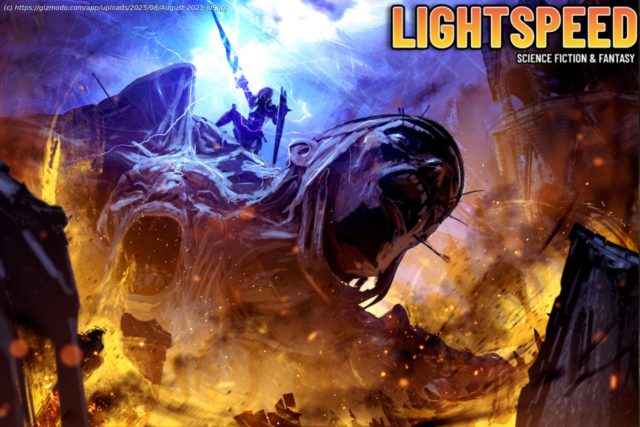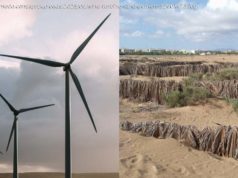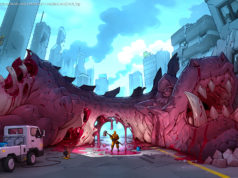Read ‘It Might Be He Returns’ by Fatima Taqvi on io9, courtesy of Lightspeed Magazine.
io9 is proud to present fiction from Lightspeed Magazine. Once a month, we feature a story from Lightspeed’s current issue. This month’s selection is “It Might Be He Returns” by Fatima Taqvi. Enjoy!It Might Be He Returns
What you need to know about the boy in this story is he is always hungry and the sun is always too hot for him, and he would save the world if he could. This is what he tells himself as he sits opposite the tailor’s shop, looking at the clothes sway in the breeze of the air conditioner within. Fawad would save the world, he would change fate itself. He would give his parents the best of the best. March into any school he wants. Get any kind of education he needs to feel like the person he knows he could be.
The mirror in Master Jee’s shop has always stretched itself up at a tilt behind the counter, framed by the stitched clothes that hang around it. A thin crack smiles across its grime. The fast approaching and departing shapes of Karachi’s blurred traffic reflect on its surface in unsettling bursts. Perhaps it would have been better had it been facing somewhere else. But then none of what was to come would have happened.
The first time Fawad saw the mirror’s true intentions, he was sitting cross-legged against a wall of the shops opposite the tailor’s shop, scratching a map of all he knew into the dirt. He was thinking, always thinking. What to do? Where to go? One of his sandals was about to break, should he spend time looking for a new pair? Pangs of hunger assailed him and the world grew and contracted over the emptiness, shimmering at the edges, radiating unintelligible truths only he felt the impact of.
Opposite the road, the mirror beamed the sun’s reflection back so brilliantly that for the moment that Fawad stopped, his gaze dragged up towards its face where it shone through the glass behind the crouched figure of the tailor over a sewing machine.
Just in time to see the tailor’s reflection peel away from the rest of its flat mirror world and stand up.
Fawad had wobbled where he was sitting, almost passing out. The tailor’s reflection paused for the longest moment, before giving a defeated shrug and sitting down again in faithful imitation of Master Jee as both tailors shook out a length of white cotton.
The next time it happened, he couldn’t breathe, and the last time he almost lost control of his bladder. The reflection had taken to tilting its head, shading its eyes with one hand as it peered out from the shop window. Craning over its doppelganger’s shoulder, face hidden in a flash of light. One arm reaching up. Pointing straight at him.
Needless to say, Fawad was scared out of his mind. At first, at least. Because, really, no matter how strange these happenings are, the mirror belongs to a very large group of things that have nothing to do with him. He is outside, on the streets. It is inside.
When his father died, the inside places all closed themselves to him. People he used to know started sitting too close together, taking up all the space and leaving him none, staring up at him, as if in shock he thought they would yield him a millimeter. When he showed up at school, the Vice Principal held him by the ear and dragged him back out of the school gates. Would there be any payment coming for his fees, she asked. Because if not, it was time he became a man and earned for himself. A man. And schools were for children.
The school gates were bolted twice behind him, once sideways and the other bolt going into the ground, deep into the earth, maybe the aluminum went rattling all the way down into the earth’s core, where no doubt his father sat with all the other dead and deceased swapping stories. The school gates shook for a moment, as if filled with rage. Then stood still and silent as a monument.
The last inside place left was home, and that was swallowed soon after the funeral by the grubby hands of leering, red-eyed uncles, and blockaded by the sharp tongues of aunts who snatched his old model of a cell phone, his school uniform, his small collection of books and toys for their children.
Now all he owns is his name. His name and his hunger, and his last thought every night that if nobody was ready to save the world, he would have loved to if he could.
Fawad.
The yearning in the voice hits him first. The need. Colliding with the emptiness and fullness that coexist inside him, his stupor and aches meet a sensation so strong it creates a pulling, a suction.
And then—
Ignore it. Yes, it’s loud, it blocks everything else out, but is it as loud as the call of styrofoam boxes of hot, greasy food being distributed right now beneath the bridge? Kindly faces waited for him in that great big outside place, a foot away from screaming traffic. If he could feed himself, keep living a bit longer, avoid the gangs so keen to recruit more children with or without their will, he might make it to being a gardener like his father. His father had been successful and well-liked, going around to those large sprawling houses full of shiny things and fed people. He made enough money to send Fawad to school. But remembering all this was a mistake on Fawad’s part, because now he recalled his father’s softness as he’d draw Fawad to him, saying, “You must not be a gardener when you grow up. Not like me. We will find you scholarships. This is Karachi! There are schools, colleges, tuition centers on every street. You will learn, you will grow up, you will change the world.”
And he is undone, left entirely open to the designs of the mirror who now calls to him again without words.
Not by his name. It snares him now, this unshaped sound. The slow vibration of a mother’s breathing whose chest moves as you lie on it. Until it stops moving altogether, and there is nothing but the shrill tone of something else entirely.
He’s already there without really deciding to do it, feet at the door to Master Jee’s shop, twitching hand on the glass. The mirror reaches inside his head, twisting something essential that connects his heart to his eyes. His soul shudders to the resonance of the summoning.
Inside the shop, immediately blanketed in the silent cold of the air conditioning, the mirror is taller than he recalled. He’s giddy, as if looking down from a great height. What if he looks at the mirror and his reflection is all wrong?
But it isn’t. It’s just as he is. Though the set of his reflection’s jaw has a look about it. Maybe it already knows what will happen next.
Master Jee glances at him, his lips part and his brow furrows, but a flash from the mirror, and Master Jee’s face relaxes. He turns away, humming an old song, from days back when bills weren’t so high and he would imagine a more comfortable old age.
Fawad runs his fingers along the mirror’s surface. He traces the outlines of the grime, but he cannot feel its ridges and bumps as he should. The cloud is beneath the mirror’s smooth surface. Inherent to its substance.
As if he has planned it all along, as if he is a happy dancer at a mehndi, he lifts a foot, twists his body, and steps right through the mirror.
Once, on one of Fawad’s birthdays, his father had bought him a cake like the ones they’d seen lining the shelves in bakeries. A white creamy cake, with triangular chunks of sweet pineapple closing ranks in a circle, usually reserved for the children of fathers on whose chests the expenses of everyday life didn’t weigh so heavy. The sun had done its work and the cream cake was soft. As the mirror now melts around the contours of his body, Fawad thinks of how the knife had fallen through his birthday cake as he’d cut it, like it had waited all its life for the knife to know it. He is a little boy again. It is his birthday, his father smiles, he laughs and jumps on the spot for a slice, and falls through the mirror on the other side.
Darkness. Neither of night, nor of power failure, because he can see perfectly well. Light is not needed—everything here carries its own light within itself, glowing against the void.
He turns. There are clothes on either side of the mirror on this side too. They bulge as if filled by invisible bodies. The ends of the kameezes move as if swaying. The shoulders slump, the necklines loll, all this fills him with terror, and he looks away.
The Other Tailor’s shop is only a glowing facade, marooned in all this darkness. There are walls, but they’re not joined at the top. There is no roof. A door frame but no glass door. The shop rumbles, it is cold, but there is no air conditioner.
I must go, he thinks. What am I doing? Djinn, churail, demons, all the stories he’s ever heard race through his mind. Who else would live here in this sunless land?
In the darkness behind him there’s a sound, and he sees in the spaces between the disconnected walls a large horse made of paper trot away down an unseen road, tattered reins slack at its side. The horse’s eyes are blinkered by decades-old newspapers yellowed by age. It shakes its inky mane as it trots along, and Fawad sees an ad for a nightclub scrunched up over one eye, an announcement from a mosque over the other.
As it disappears Fawad realizes he has no idea what else lurks just beyond. Perhaps the next creature may be something other than a horse.
But when he turns to leave, the clothes don’t look the same. Why hasn’t he tried one on yet, his mind demands to know. These clothes are so alluring, so beautiful, and kept ready for him by some kind hand no doubt. Look at this sherwani, for example. What a prince he’d look. His Vice Principal would hold him as an example to the other students. His uncles would hold the doors of his home open to him again. He could hand out food under bridges instead of being the one taking.
He lifts his own gray kameez over his shoulders.
“Stop that.”
The voice comes from beyond, and he sees now it belongs to a person, another human. Master Jee.
Except it isn’t, not at all. He wears the same clothes. The same spotless brown kameez. The same agate ring on his index finger. The same Peshawari chappal on his feet.
But his ring is on his left hand. Not the right. He’s hunched over, absorbed in some work he holds in his hands, and the cap he wears throws a shadow on his face. He’s bent, turned slightly away, and his face is hidden from view. And it’s easy to see he isn’t human at all. He’s too still. He radiates lack.
“Get out of here.” He says, curt as all people belonging to inside spaces are. “You don’t belong.”
“I was called.” Indignation triumphs over fear, and Fawad peers closer. He sees a glint of something on the Other Tailor’s face. Hard to see.
A cat yowls from a corner, making him jump. It dashes across Fawad’s vision, made up entirely of scrunched up Urdu magazines ripped apart and remade to a feline form, an extract of a forgotten short story legible across its back.
“You really didn’t call me?” He stirs uneasily. He knows he was called. But now that he’s here, he doubts any of it happened.
“Those meant to be here are here.” The Other Tailor replies. “But you must go if you are not interested in untangling these threads. For there is a lot to do, and I work to a deadline. And I only warn you away from those,” he waves a hand without looking up in the direction of the clothes, “because they have had their fill already. Which is why they look so fine.”
Fawad now sees a sleeve has snaked closer to him. It stops the moment he sees it.
The Other Tailor seats himself on a stool and bends over his work.
Домой
United States
USA — software A Mirror World Brings Wonders—and Dread—in This Fantasy Short Story






